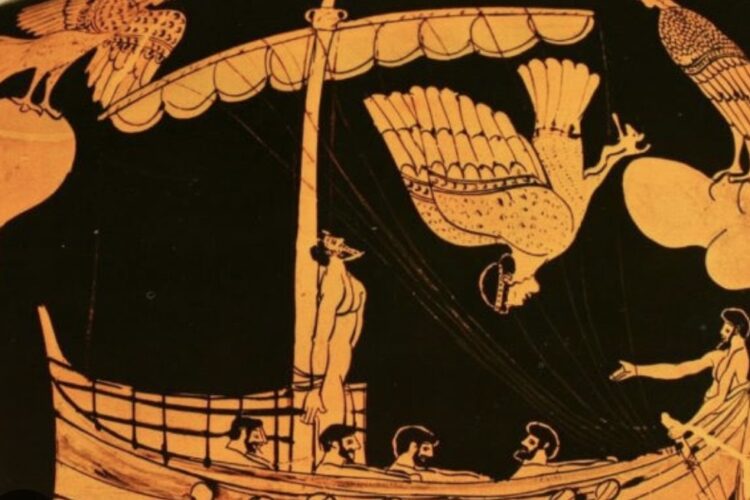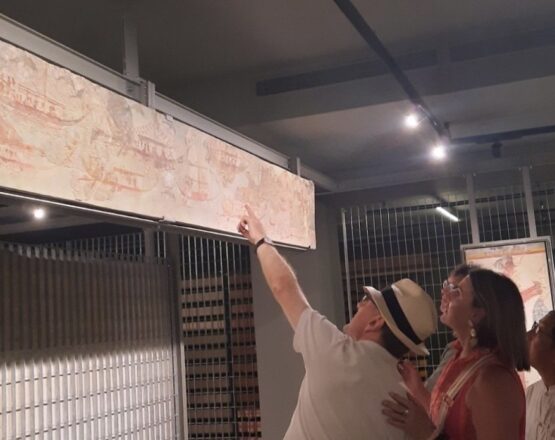Travels and Journeys, from the earliest ever recorded in European Literature until today

It is not wandering that is a disaster, but not knowing where you are going.”
– Heraclitus.
When Odysseus tied himself to the mast of his ship, it was not just to save himself from madness. It was to listen without being lost; to surrender without submitting. His wanderings were a personal journey.
The Sirens were not just mythological monsters; they were the voices of consciousness. The name ” Homer (the non-seeing ), is derived because his allegorical discourse was about what the physical eyes do not see, but the eyes of the soul. This, however, was known only to the initiated.
As the ship approaches the Siren Islands, Odysseus is not just a traveller of the world – he is now a traveller of the inner world.
His tethering to the mast is not an act of weakness; it is a call to the adventure of truth. There, on the threshold between the visible and the invisible, he leaves the familiar self behind and passes into a place where the voices of the Sirens become mirrors – not of desire, but of revelation.
Everything that brought him here – fame, glory, home – is now silenced, and what speaks is only the soul.
The Song of the Sirens sang to him …
Clever and long-lived Odysseus, son of Laertes, lord of Ithaca – welcome to the heart of the world, to the timeless place where memory meets truth. You have not feared our form and fame; You have fear for what you shall learn if you hear us.
You command your sailors to bind you to the mast so that you survive the apocalypse.
Know this: it is not the gods that punish you, but the judgments and your choices. The Troy you conquered was not your true enemy. The real war you ought to fight is with yourself. A hero is not the one who wins the war, but the one who defeats himself. The sword does not cut illusions – only insight strips them away.
The Ithaca you long for no longer exists. Time -Cronos is inexorable; he is the Great Processor, the Judge and the Master. In life and on the journey to Ithaca you do not return; you are transformed. You are no longer the one who left. Your loved ones will also not be the same. Ithaca is not on earth – it is the divine spark that the gods have hidden deep within every human being.
Do not trust the dogmas and stereotypes of men; these give birth to the most insidious delusions. Whatever you think you are imprisons you. People want to believe, not think. They want hopes, not truths. They want saviours, not mirrors. But you are both sower and reaper.
Here, now in time and pain stop. Here you don’t have to fight. Give us your heart – it will stop bleeding. Give us your soul – it will stop thirsting. Stay with us.
Here, you need neither hope nor fear. Here doubt does not crush you, but redeems you. Look deep within yourself to see who you are, where you come from and where you are going. What you carry that weighs you down and what you must leave behind. If you just want to rest, come and never leave; nothing will bother you anymore. Resignation is redemption for the faint-hearted. Weigh the wants and the needs and decide.”
Odysseus does not answer; a tear only flows.
Odysseus exclaims:
“Am I the one who travels, or the one who remains after each journey? The Sirens did not kill me; they stripped me bare. They showed me the Ithaca I didn’t know I was looking for: the liberation from myself, the truth that cannot be told, the life that begins when you dare to doubt. Return is the beginning of wisdom. And wisdom… the echo of those voices I dared to hear.”
The Sirens’ song was not a call to death, but to truth. And truth does not seduce; it uproots. The one who heard and survived is not the same man anymore; he is initiated into himself, a man who does not return but is reborn. As Odysseus prepares to untie the ropes that bind him to the mast, he knows that his real journey is just beginning.


